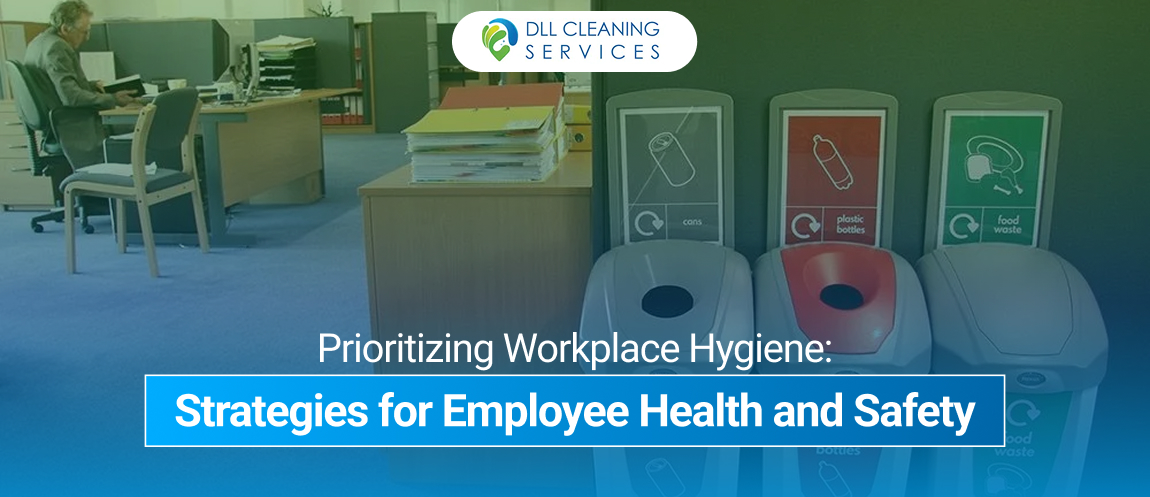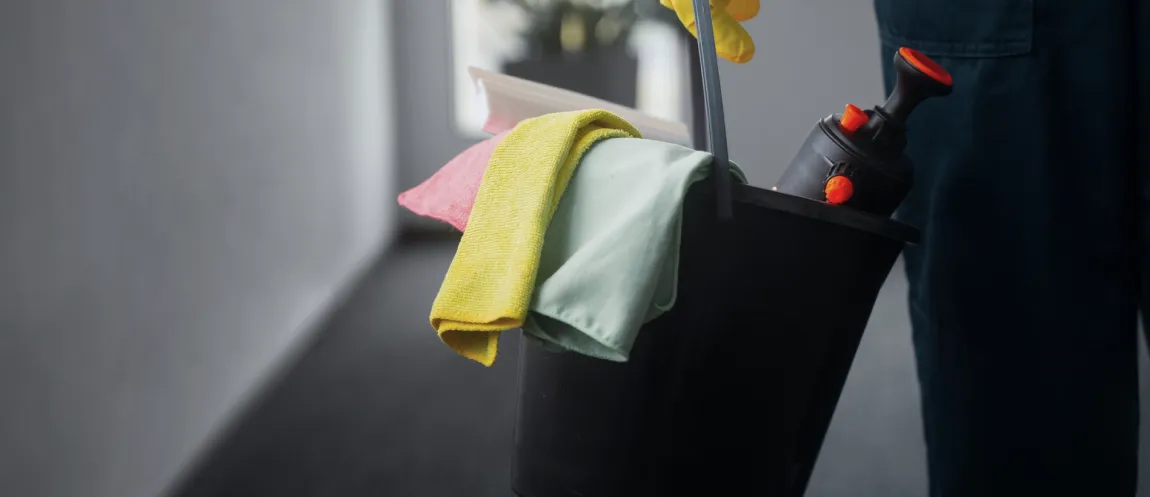A messy kitchen, overflowing trash, or unclean shared items can put your health and your team’s health at risk in your daily work environment. If you don’t address these issues promptly, they’re likely to get worse. Further, the COVID-19 pandemic highlighted the importance of workplace cleanliness. Even though the pandemic is less of a concern now, the lessons about hygiene and the need for a clean workspace still matter.
It’s common sense to say that maintaining workplace hygiene can stop diseases from spreading, but it’s more than that. Investing in commercial cleaning services can ensure a consistently clean and sanitized environment, reducing health risks and improving overall workplace productivity.
How Do You Ensure Hygiene In The Workplace?
Create a Workplace Hygiene Policy
Share a written workplace hygiene policy with your staff. Let them know your goals and expectations for a clean workplace. This communicates the importance of maintaining cleanliness at work.
Maintain Clean Bathrooms and Kitchens
Bathrooms and kitchens can become breeding grounds for bacteria, so it’s essential to uphold high levels of hygiene.
For basic bathroom hygiene, keep them stocked with antibacterial soap, toilet paper, and hand towels. Also, remind employees to wash their hands and leave the sink and stalls clean for others.
In the office kitchen, it’s equally important for sanitation. All of the staff should clean up after themselves while preparing and eating food. Pay extra attention to frequently used areas like the fridge, surfaces, and sink. Further, regularly wash and maintain utensils and equipment, which should be part of your workplace hygiene policy.
Moreover, you can always get good cleaning services in the USA, but you should have certain rules in place for your employees, too.
Provide Antibacterial Wipes, Sanitizer, and Tissues
Offer items like antibacterial wipes, hand sanitizers, and tissues to help your staff keep their workspaces clean. When these items are easily accessible, employees are more likely to use them.
Maintain a Clean Workplace
Your workplace should be cleaned regularly. This not only helps prevent the spread of infections but also upholds a professional appearance. Also, consider implementing a cleaning schedule with tasks distributed among the staff. If your team lacks the cleaning capacity, hire office cleaning services.
Promote Handwashing
Further, encourage all employees and visitors to wash and dry their hands:
● Before and after eating.
● After coughing or sneezing.
● After using the restroom.
● When switching tasks and after touching potentially contaminated surfaces.
When handwashing isn’t feasible, use an alcohol-based hand sanitizer with at least 60% ethanol or 70% isopropanol, following the manufacturer’s instructions.
Read Also: How Do I Create A Referral Program For My Cleaning Business?
Why Is Workplace Hygiene Important?
Health and Safety
● A clean workplace lessens the possibilities of accidents, injuries, and occupational health issues.
● Proper measures help prevent the spread of infections and illnesses among employees.
Employee Well-Being
● Maintaining a hygienic workspace is mandated for the physical and mental health of employees.
● Also, good hygiene practices can lead to increased job satisfaction and reduced absenteeism due to illness.
Productivity
● It enables employees to focus on their tasks efficiently.
● Turns down distractions and time wasted searching for clean tools and materials.
Professional Image
● Presents a positive impression to clients, visitors, and potential business partners.
● Additionally, demonstrates a commitment to quality and attention to detail.
Legal Compliance
● Adherence to hygiene regulations and standards is essential to avoid legal issues.
● Failure to comply may result in fines or legal liabilities.
Cost Savings
● Prevents unnecessary expenses associated with employee health issues or fines.
● Also, increases the lifespan of equipment and narrows the need for frequent replacements.
Team Collaboration
● A clean and organized workspace fosters teamwork and a sense of pride among employees.
● It encourages better communication and collaboration.
Environmental Responsibility
● Promoting eco-friendly hygiene practices, such as recycling and minimizing waste, contributes to sustainability.
● Also, it aligns with corporate social responsibility efforts and demonstrates a commitment to environmental stewardship.
Professional commercial cleaning services for your office or workspace? Contact us today for top-quality cleaning and a healthier environment!
What Are 5 Good Hygiene Practices You Should Follow?
Employee Hygiene
● Employees should maintain personal hygiene standards, such as daily showers and the use of deodorant.
● If appropriate, establish a dress code that reflects the importance of personal grooming, particularly in customer-facing roles.
● Further, provide facilities for employees to change into clean work attire and store personal items securely.
Touchless Access Control
● Eliminates the need for physical contact, reducing the risk of germ transmission.
● Enhances the entry and exit experience and bolsters security when integrated with technologies like License Plate Recognition (LPR) cameras and visitor management systems.
Automated Cleaning Protocols
● Utilization of robotics and automation for consistent and error-free cleaning.
● Additionally, this maintains that workspaces are sanitized effectively, decreasing the chances of contamination.
Air Purification Systems
● Implementation of advanced air purifiers to filter out pathogens, allergens, and pollutants.
● Creates a healthier breathing environment for employees, promoting overall well-being.
Holistic Approach
● Advocating a comprehensive approach to workplace cleanliness as part of a broader strategy to enhance employee health and well-being.
● Also, recognizing that a healthy work environment contributes to employee satisfaction and productivity while lessening health-related concerns.
Read Also: How Do I Create A Referral Program For My Cleaning Business?
What Are The Four Different Things Basic Hygiene In The Workplace Can Be Attributed To?
Personal Hygiene
● Employees should practice proper handwashing, using soap and warm water for at least 20 seconds, especially before handling food or shared equipment.
● Grooming standards can include guidelines on maintaining clean clothing.
Work Area Cleanliness
● Individual workspaces should be clutter-free and regularly sanitized. Desks, computer equipment, and shared tools need to be wiped down with disinfectant wipes.
● Further, communal areas should be kept organized and free from debris.
Clean Restroom Facilities
● Restroom facilities should be scrubbed daily, with frequent checks for replenishing supplies like soap, hand sanitizer, and toilet paper.
● Clear signage regarding proper handwashing techniques can be posted, and touchless fixtures can be installed to minimize contact points.
Clean Kitchen
● Kitchen areas should be equipped with designated storage for employees’ food, with clear labeling and regular refrigerator clean-outs to prevent expired or spoiled items.
● Scheduled cleaning routines, including the sanitation of countertops, sinks, and kitchen appliances, are required to maintain a safe and hygienic food preparation environment.
Contact us today for reliable and top-quality cleaning solutions—because a clean workspace means a productive team!
What Is An Example Of A Personal Hygiene Policy In The Workplace?
A More Frequent and Intensive Cleaning Schedule
A more efficient cleaning routine with clear guidelines can help decrease the spread of germs and bacteria within the office. This schedule should focus on maintaining cleanliness and disinfecting surfaces, equipment, and restrooms, with particular attention to high-traffic areas.
A new cleaning schedule is a tangible way to demonstrate your concern for cleanliness, visible to all employees. Once in a while, also think about getting professional deep cleaning services because that is nothing short of a requirement if you’re in NYC.
Preventing Sick Employees from Coming to Work
The pandemic has highlighted the importance of not coming to work when feeling unwell. Your company can enforce this by offering sick days and remote work options. Coming to work while sick can contribute to disease transmission and hinder people’s recovery, ultimately harming the workplace.
Call in quality janitorial services to sweep the space if this safety protocol was somehow compromised.
Proper Waste Management
Regular recycling is a dependable way to enhance hygiene in your workplace. Additionally, storing waste appropriately reduces clutter on the premises and minimizes the probability of accidents, such as tripping over misplaced carton boxes. This is often a part of the standard procedures of most cleaning services in New York. So, you can also hire some professionals to hand over most of these responsibilities to them.
Designated Eating and Drinking Areas
To get rid of unnecessary mess and ease the workload of cleaners, consider designating separate areas for eating and drinking, distinct from workstations. This practice, often referred to as a clean desk policy, manages office clutter. With fewer food and drink items in work areas, it becomes easier for both employees and cleaners to maintain a tidy office.
Takeaway
It goes without saying; hygiene is something you can’t and should never compromise on. It’s great if you have an in-house staff and they’re well trained to keep your place shining nonstop. However, that can sometimes be too much work and it might be better to leave it to the professionals. Luckily, there is no shortage of good cleaning companies in the USA out of which DLL Cleaning Service is one.
Reach out to us and we’ll head over to your workspace right away to make sure it’s as clean and hygienic you want it to be




